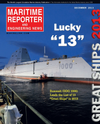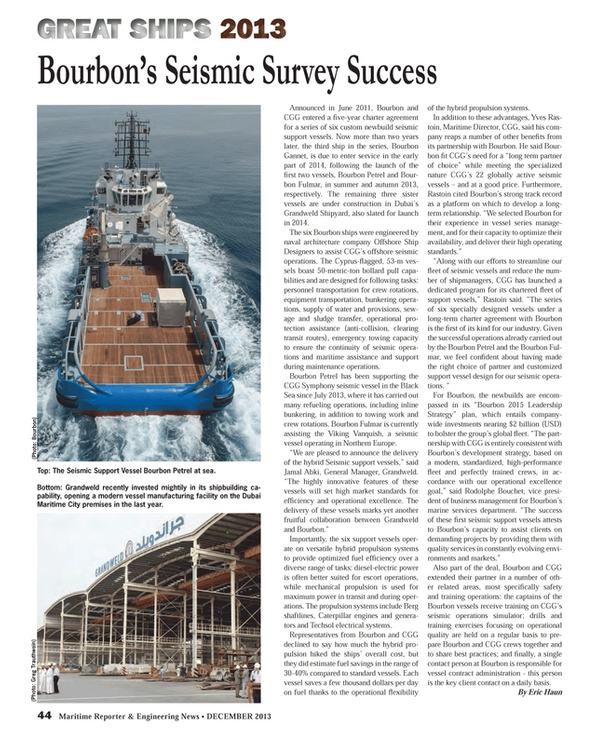
Bourbon and CGG Partner for Seismic Survey Success
Announced in June 2011, Bourbon and CGG entered a five-year charter agreement for a series of six custom newbuild seismic support vessels. Now more than two years later, the third ship in the series, Bourbon Gannet, is due to enter service in the early part of 2014, following the launch of the first two vessels, Bourbon Petrel and Bourbon Fulmar, in summer and autumn 2013, respectively. The remaining three sister vessels are under construction in Dubai’s Grandweld Shipyard, also slated for launch in 2014.
The six Bourbon ships were engineered by naval architecture company Offshore Ship Designers to assist CGG’s offshore seismic operations. The Cyprus-flagged, 53-m vessels boast 50-metric-ton bollard pull capabilities and are designed for following tasks: personnel transportation for crew rotations, equipment transportation, bunkering operations, supply of water and provisions, sewage and sludge transfer, operational protection assistance (anti-collision, clearing transit routes), emergency towing capacity to ensure the continuity of seismic operations and maritime assistance and support during maintenance operations.
Bourbon Petrel has been supporting the CGG Symphony seismic vessel in the Black Sea since July 2013, where it has carried out many refueling operations, including inline bunkering, in addition to towing work and crew rotations. Bourbon Fulmar is currently assisting the Viking Vanquish, a seismic vessel operating in Northern Europe.
“We are pleased to announce the delivery of the hybrid Seismic support vessels,” said Jamal Abki, General Manager, Grandweld. “The highly innovative features of these vessels will set high market standards for efficiency and operational excellence. The delivery of these vessels marks yet another fruitful collaboration between Grandweld and Bourbon.”
Importantly, the six support vessels operate on versatile hybrid propulsion systems to provide optimized fuel efficiency over a diverse range of tasks: diesel-electric power is often better suited for escort operations, while mechanical propulsion is used for maximum power in transit and during operations. The propulsion systems include Berg shaftlines, Caterpillar engines and generators and Techsol electrical systems.
Representatives from Bourbon and CGG declined to say how much the hybrid propulsion hiked the ships’ overall cost, but they did estimate fuel savings in the range of 30-40% compared to standard vessels. Each vessel saves a few thousand dollars per day on fuel thanks to the operational flexibility of the hybrid propulsion systems.
In addition to these advantages, Yves Rastoin, Maritime Director, CGG, said his company reaps a number of other benefits from its partnership with Bourbon. He said Bourbon fit CGG’s need for a “long term partner of choice” while meeting the specialized nature CGG’s 22 globally active seismic vessels – and at a good price. Furthermore, Rastoin cited Bourbon’s strong track record as a platform on which to develop a long-term relationship. “We selected Bourbon for their experience in vessel series management, and for their capacity to optimize their availability, and deliver their high operating standards.”
“Along with our efforts to streamline our fleet of seismic vessels and reduce the number of shipmanagers, CGG has launched a dedicated program for its chartered fleet of support vessels,” Rastoin said. “The series of six specially designed vessels under a long-term charter agreement with Bourbon is the first of its kind for our industry. Given the successful operations already carried out by the Bourbon Petrel and the Bourbon Fulmar, we feel confident about having made the right choice of partner and customized support vessel design for our seismic operations. “
For Bourbon, the newbuilds are encompassed in its “Bourbon 2015 Leadership Strategy” plan, which entails company-wide investments nearing $2 billion (USD) to bolster the group’s global fleet. “The partnership with CGG is entirely consistent with Bourbon’s development strategy, based on a modern, standardized, high-performance fleet and perfectly trained crews, in accordance with our operational excellence goal,” said Rodolphe Bouchet, vice president of business management for Bourbon’s marine services department. “The success of these first seismic support vessels attests to Bourbon’s capacity to assist clients on demanding projects by providing them with quality services in constantly evolving environments and markets.”
Also part of the deal, Bourbon and CGG extended their partner in a number of other related areas, most specifically safety and training operations: the captains of the Bourbon vessels receive training on CGG’s seismic operations simulator; drills and training exercises focusing on operational quality are held on a regular basis to prepare Bourbon and CGG crews together and to share best practices; and finally, a single contact person at Bourbon is responsible for vessel contract administration - this person is the key client contact on a daily basis.
(As published in the December2013 edition of Maritime Reporter & Engineering News - www.marinelink.com)
Read Bourbon and CGG Partner for Seismic Survey Success in Pdf, Flash or Html5 edition of December 2013 Maritime Reporter
Other stories from December 2013 issue
Content
- Coming your way, a 3% rise in Operating Costs page: 10
- Five Minutes With: Tore Morten Olsen, Astrium Services page: 12
- Marine Cybersecurity: Is Your Ship Safe? Are You Sure? page: 16
- U.S. Export Reform: New Year, New Rules page: 18
- U.S. Port Security and the Impact of Sequester & Budget Woes page: 20
- Global Port Security and BMT Isis page: 22
- LED Lighting: Reduced Costs, Enhanced Safety page: 24
- India's Maritime Growth Fueled by Foreign Companies page: 26
- New Crane from Liebherr for Harbors, Offshore page: 28
- Ship Power: Out of the Past Comes Wärtsilä's Engine of the Future page: 30
- The Navy’s Battlewagon of the 21st Century page: 34
- Maersk’s Mammoth Containerships Making History page: 40
- New Bulk Carrier from Imabari Offers Unique Advantages page: 42
- Damen PSV 3300: A Diamond in the Rough page: 43
- Bourbon and CGG Partner for Seismic Survey Success page: 44
- Great Ships of 2013: Shuttle Tanker RIO 2016 for TEN page: 45
- Great Ships of 2013: Bow Pioneer page: 46
- Great Ships of 2013: Hornbeck’s HOSMAX 300 Series page: 47
- Great Ships of 2013: Oceanex Connaigra page: 48
- Great Ships of 2013: Hydra Voyager page: 48
- Great Ships of 2013: Damen Modular Barge page: 49
- What’s New with Floating Production? page: 50
- New Monitoring System from Rexroth page: 56
- Regal Motors Win Russian OK page: 56
- Jotun Debuts New Eco Antifouling page: 56
- New “Energy Demand Forecast System for Ships” page: 56
- Ultra Steam Turbine Plants page: 56
- Delta Plasma Rotator Launched page: 56
- LaBorde Launches New Compact Power Unit page: 56
- MTU Gensets for British Combat Ship page: 57
- Product Spotlight: Viking LifeCraft Evacuation System page: 57
- Sherwin-Williams Launch Marine Coatings App page: 57
- SMT Develops Robotic Tube Cutter page: 57
- Optimarin Inks Ballast Water Treatment Deal with V.Ships page: 57
- SturdiLED LED Floodlight Released page: 57
- IHC Debuts “Zero-Pollution” Seal page: 57


